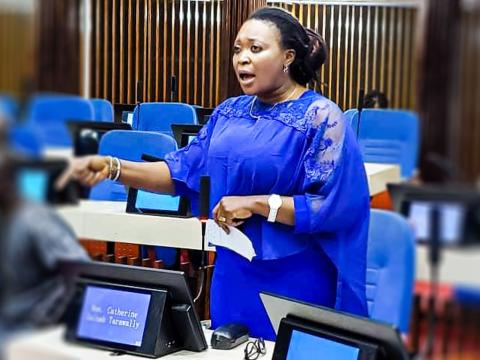By Nasratu Kargbo
Following the removal of safe seats for women in the Public Election Act 2022 (PEA), women’s groups, female politicians, and other Civil Society Organisations have called for a review of the 1991 constitution in order to protect women’s rights and ensure that Gender Equality and Women’s Empowerment (GEWE) Bill which addresses the issue of a safe seat in all sector, becomes a success.
In an interview with Politico on the 2nd August 2022, the Chairperson for the Gender and Children’s Committee in Parliament representing Constituency 037 Catherine Zainab Tarawally stated that “the constitution needs to be amended”.
The MP explained that during the debate on the PEA, she challenged her colleague MPs who admitted not to have gone through the rigorous time of amending sections of the constitution. She added that their excuses were that they could not amend section 74 of the 1991 constitution which speaks on the composition of parliament, and section 27 which talks on discrimination.
“They said they will find a better time to look into the issue, I asked what better time is better than this? They said no they cannot do anything now, because the time is not in their favour. So, I asked for our bill” explained Tarawally.
She expressed dissatisfaction over the removal of the safe seat for women, and said they have the right to be unhappy.
She explained that even the clause that is considered to be compensation, section 59(2) of the Act which states that for every two nominations the third should be a woman, Tarawally said: “it is not even sacrosanct, it is not even fixed, it does not guarantee our 30% and it is not binding for political parties. The constitution needs to be amended”.
She explained that she has on several occasions called on the Speaker of parliament to do favour and justice to women by bringing the bill for it to be passed into law.
President of the 50/50 Group Sierra Leone Haja Alimatu Abdullah is also hopeful for a constitutional review.
She explained that women were represented in the Constitutional Review Committee and that position papers were given which consisted of everything that will enable women to become active participants in politics and the development of the country. She expressed hope that the things that they are not comfortable with in the 1991 constitution will be corrected when the constitutional review recommendations are implemented.
When asked whether the group has intentions to engage the government on the matter owing to the fact that excuses were made in passing safe seats on the PEA and that same could be done in the GEWE, Abdullah noted that they are optimistic that such will not happen.
She mentioned that when the Public Elections Act was brought with 55(c) that spoke of 30% for women, they were happy and thought that their wish will be realized. She noted that the women in Sierra Leone have advocated for 30% seats in parliament and councils, noting that it is yet to be achieved.
She said they are happy with 59(2), but noted that the section limits women. According to the President, they would have preferred that “at least one of the three should be a woman”, as that could have given the opportunity for more than one woman to be nominated.
She explained that the GEWE bill provides for 30% in all sectors but said women should not be given things on a token basis, especially when they make up the majority of the country’s population. “We should be given the right to express ourselves and the potential that God has given us for the interest of Sierra Leone,” said Abdullah
A press release issued by Campaign for Good Governance (CGG) called for a constitutional review, noting that the government should “integrate more women’s fundamental human rights into the Constitution recommended by the CRC Report”.
The institution has in the release expressed disappointment over the removal of the reserved seat and also stated that Clause 59(2) does not compensate for the safe seat.
“Nomination is not a guarantee for women to win parliamentary, council, and other elective positions. This, therefore, needs further clarity as we implore Government to develop the regulations that will ensure enforcement of section 59 (2)”, a part reads. The release noted that there were no penalty clauses for failure to comply with the provision made.
Concern was also raised over the 12-month resignation period for public servants; a move the group says will reduce women’s participation. The release stated that the provision has affected women, particularly those that are prominent in the public social service sector that cannot resign a year to the Polls. “We note that women constitute the highest percentage of the poverty bracket and considering the expensive nature of elections in our context, the continued existence of this provision will limit women’s participation” a part of the statement reads.
The Group in the release called on Parliament to give careful consideration to the above limitations made and to reopen the debate on the GEWE bill.








